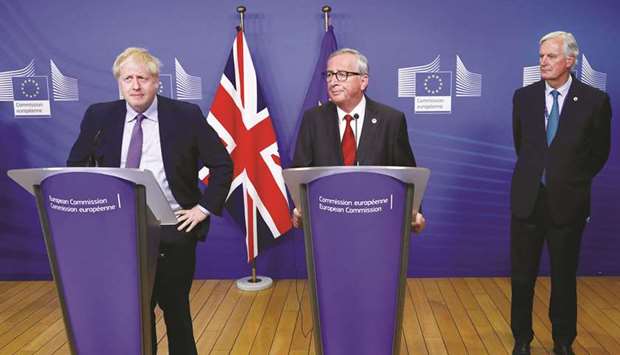European Union leaders yesterday gave their unanimous backing to a Brexit deal with Britain, putting the onus on Prime Minister Boris Johnson to secure parliament’s approval for the deal in a vote in two days’ time.
British and EU negotiators reached the agreement after successive days of late-night talks and nearly three years of heated discussions that have strained EU-UK ties.
After the deal was announced, Johnson joined the EU’s 27 other leaders at a summit in Brussels, shaking each by the hand as he entered the room and laughing and joking with German Chancellor Angela Merkel and French President Emmanuel Macron.
He then left them to decide whether they approved the deal.
After a little over an hour of discussion, the leaders issued a joint statement endorsing it.
“Now is the moment for us to get Brexit done and then together to work on building our future partnership, which I think can be incredibly positive both for the UK and for the EU,” Johnson told a a joint news conference with commission president Jean-Claude Juncker before the summit began.
“I hope very much... that my fellow MPs in Westminster do now come together to get Brexit done, to get this excellent deal over the line and to deliver Brexit without any more delay.”
Juncker said he wanted he deal to be approved rapidly, with no need for any further extension of the Brexit deadline.
Brexit was initially supposed to have happened on March 31 this year. It will now take place on October 31, as long as the deal is approved by the British and European parliaments.
“There must be no prolongation — it has to happen now,” Juncker said.
Johnson now needs to secure the votes needed at an extraordinary session of parliament tomorrow.
But the arithmetic is not easy or straightforward for him.
The Northern Irish party that Johnson needs to help ratify any agreement, the Democratic Unionist Party (DUP), has refused to support it, saying it is not in Northern Ireland’s interests.
The head of the main opposition Labour Party, Jeremy Corbyn, said he was “unhappy” with the agreement and would vote against it.
Labour has said it wants any deal to be subject to a public vote, but as yet has not indicated whether it will back any move for a second referendum tomorrow.
Johnson appears intent on presenting parliament with a stark choice — the deal he has struck or no deal — in the hope of securing enough votes to get approval.
“The PM’s position is that it’s new deal or no deal but no delay,” said a senior government official. Even though parliament has passed a law obliging him to ask the EU for a delay if a deal has not been finalised and approved by tomorrow, Johnson has said he will not do it.
Negotiators worked frantically this week to agree a compromise on the question of the border between EU member Ireland and the British province of Northern Ireland, the most difficult part of Brexit.
The conundrum was how to prevent the frontier becoming a backdoor into the EU’s single market without erecting checkpoints that could undermine the 1998 Good Friday Agreement, which ended decades of conflict in the province.
The agreement reached will keep Northern Ireland in the UK customs area but tariffs will apply on goods crossing from mainland Britain to Northern Ireland if they are headed to Ireland and into the bloc’s single market.

Prime Minister Boris Johnson, European Commission president Jean-Claude Juncker and European Union’s chief Brexit negotiator Michel Barnier attend a news conference after agreeing on the Brexit deal, at the sidelines of the European Union leaders summit, in Brussels, Belgium, yesterday.
